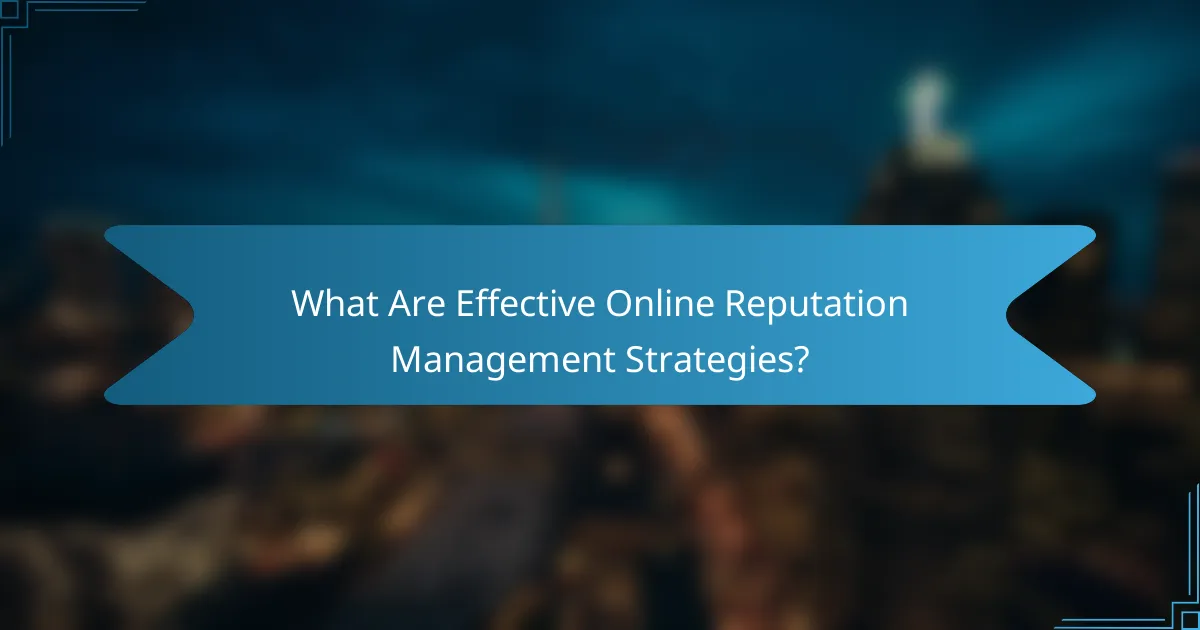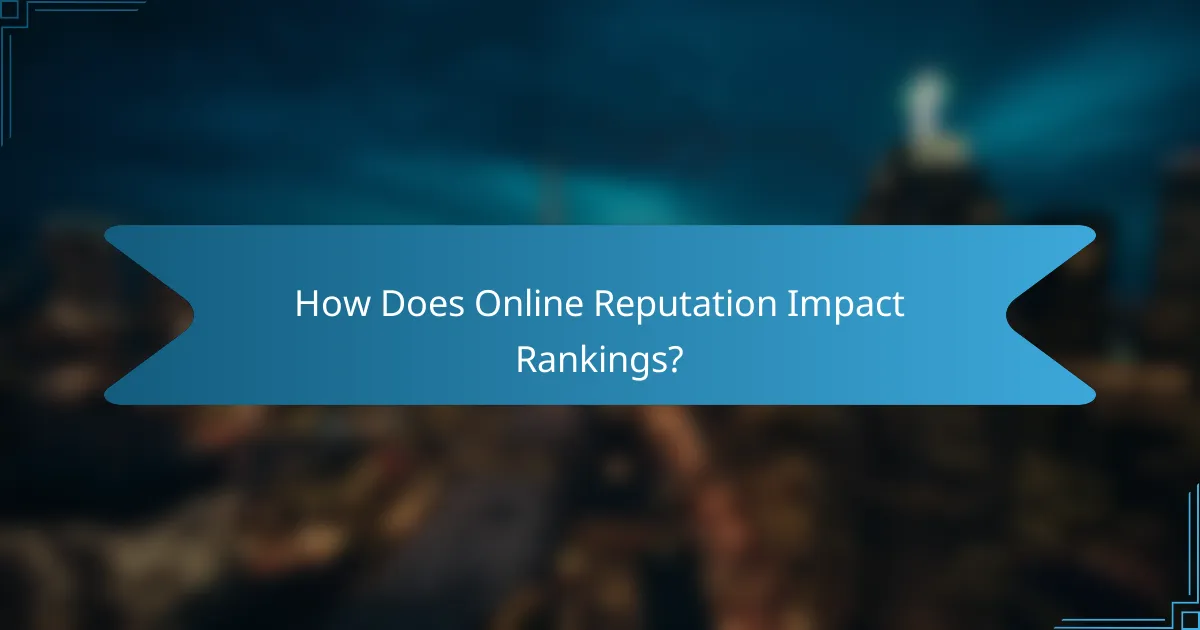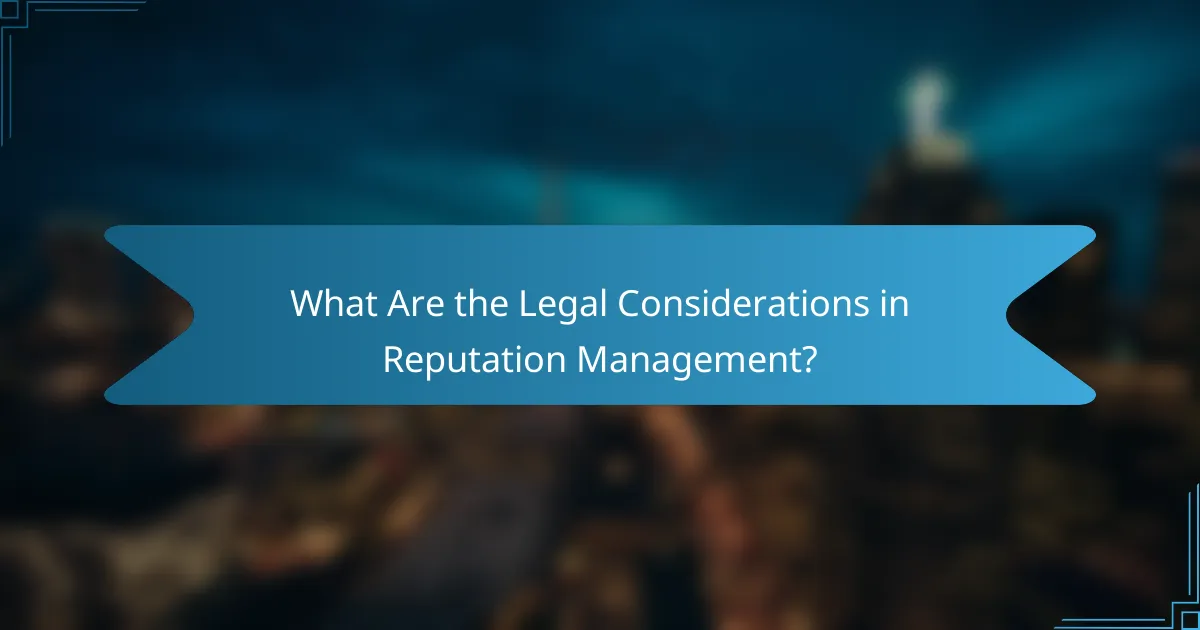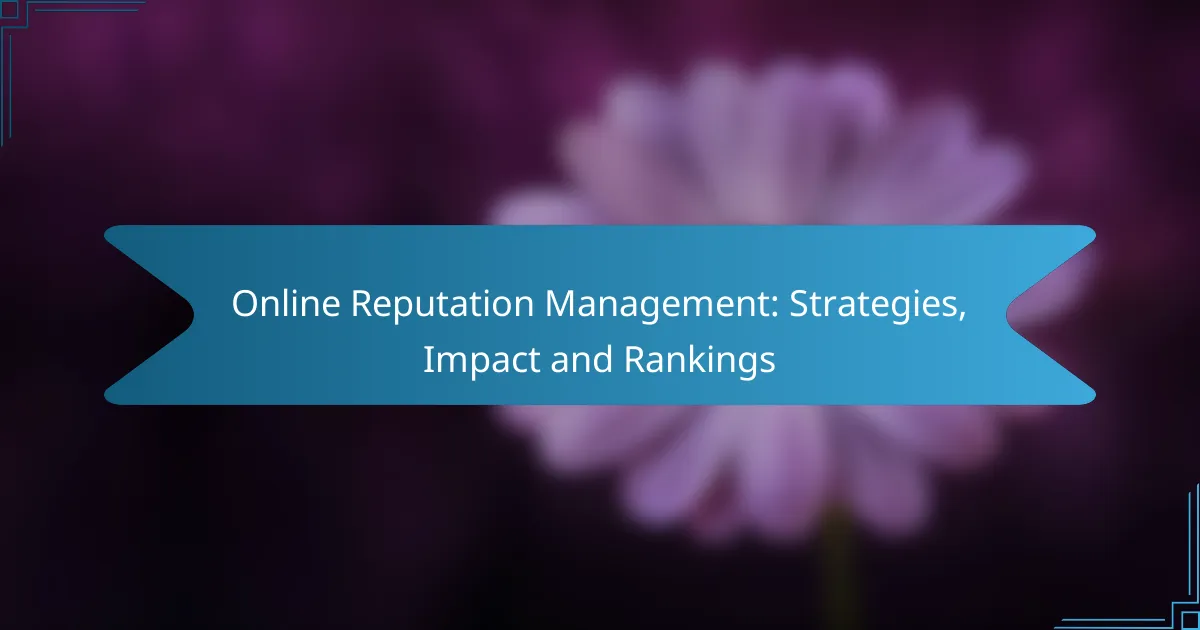Online reputation management is crucial for maintaining a positive brand image in the digital landscape. By employing strategies such as monitoring feedback, creating favorable content, and leveraging SEO, businesses can significantly influence public perception and enhance their visibility on search engines and social media platforms.

What Are Effective Online Reputation Management Strategies?
Effective online reputation management strategies involve actively monitoring your brand’s presence, responding to feedback, creating positive content, utilizing SEO techniques, and engaging on social media. These approaches help maintain a favorable image and can significantly influence public perception.
Monitoring Online Mentions
Monitoring online mentions is crucial for understanding how your brand is perceived. Use tools like Google Alerts, Mention, or social media listening platforms to track mentions across various channels. Regularly reviewing these mentions allows you to identify potential issues early and respond appropriately.
Establish a routine for checking these mentions, ideally daily or weekly, depending on your brand’s activity level. This proactive approach helps you stay ahead of negative comments or misinformation.
Responding to Reviews
Responding to reviews, both positive and negative, is essential for reputation management. Acknowledge positive feedback with gratitude and address negative reviews constructively. This shows potential customers that you value their opinions and are committed to improving your services.
When responding to negative reviews, remain calm and professional. Offer solutions or invite the reviewer to discuss the matter privately. This can turn a negative experience into a positive one and demonstrate your dedication to customer satisfaction.
Creating Positive Content
Creating positive content helps shape your brand’s narrative online. Focus on producing high-quality blog posts, videos, and social media updates that highlight your brand’s strengths and values. This content can improve your online presence and push down negative search results.
Consider using customer testimonials, case studies, or success stories to build credibility. Regularly updating your content keeps your audience engaged and enhances your reputation over time.
Utilizing SEO Techniques
Utilizing SEO techniques is vital for managing your online reputation effectively. Optimize your website and content with relevant keywords to improve visibility in search engine results. This ensures that positive content ranks higher than any negative information.
Implement strategies such as backlinking, local SEO, and on-page optimization to enhance your search rankings. Regularly audit your SEO performance to identify areas for improvement and adjust your tactics accordingly.
Engaging on Social Media
Engaging on social media is a powerful way to manage your online reputation. Actively participate in conversations, respond to comments, and share valuable content to build a positive community around your brand. This engagement fosters trust and loyalty among your audience.
Be consistent in your messaging and maintain a friendly tone. Monitor your social media channels for feedback and trends, and use this information to adapt your strategies and address any concerns promptly.

How Does Online Reputation Impact Rankings?
Online reputation significantly influences rankings on search engines and social platforms. Positive reviews and a strong online presence can enhance visibility, while negative feedback can lead to lower rankings and reduced trust.
Influence on Search Engine Results
Search engines prioritize content that reflects a brand’s reputation. High ratings and positive reviews can improve search engine optimization (SEO), leading to better placement in search results. Conversely, negative reviews can push a brand down the rankings, making it less visible to potential customers.
To optimize for search results, businesses should actively manage their online reputation by encouraging satisfied customers to leave positive feedback and addressing any negative comments promptly. Regularly updating content and engaging with users can also enhance visibility.
Effect on Brand Trust
A strong online reputation fosters trust among consumers. Brands with positive reviews and a solid online presence are more likely to be perceived as credible and reliable. This trust is crucial, as consumers often research brands before making purchasing decisions.
To build trust, companies should focus on transparency and responsiveness. Sharing customer testimonials, showcasing positive media coverage, and maintaining an active social media presence can help reinforce a trustworthy image.
Impact on Conversion Rates
Online reputation directly affects conversion rates. Brands with favorable reputations typically see higher conversion rates, as potential customers feel more confident in their purchasing decisions. A single negative review can deter a significant percentage of potential buyers.
To improve conversion rates, businesses should monitor their online reputation closely and implement strategies to enhance it. This includes responding to customer feedback, resolving issues quickly, and showcasing positive experiences through case studies or testimonials.

What Tools Are Available for Reputation Management?
Reputation management tools help individuals and businesses monitor, maintain, and improve their online presence. These tools provide insights into public perception and enable proactive management of online content.
Google Alerts
Google Alerts is a free tool that allows users to monitor the web for specific keywords related to their name, brand, or industry. By setting up alerts, users receive email notifications whenever new content is published that matches their criteria.
This tool is particularly useful for tracking mentions across various platforms, including news articles, blogs, and forums. Regularly reviewing these alerts can help identify potential issues before they escalate.
Reputation.com
Reputation.com is a comprehensive reputation management platform that offers tools for monitoring online reviews, managing customer feedback, and improving search engine visibility. It provides businesses with insights into their online reputation through analytics and reporting features.
One of its key benefits is the ability to respond to customer reviews directly from the platform, streamlining the process of engaging with customers. Consider using this tool if your business relies heavily on customer feedback and online reviews.
BrandYourself
BrandYourself is designed to help individuals and businesses improve their online presence by optimizing search results and managing personal branding. The platform offers services such as content creation, profile optimization, and removal of negative search results.
Users can create a personal brand website that showcases their skills and achievements, helping to push down negative content in search results. This tool is ideal for professionals looking to enhance their online image and control their narrative.
Hootsuite
Hootsuite is primarily a social media management tool, but it also plays a vital role in reputation management by allowing users to monitor brand mentions and engage with audiences across multiple platforms. Users can schedule posts, track engagement, and analyze performance metrics.
By using Hootsuite, businesses can maintain a consistent online presence and respond quickly to customer inquiries or negative comments. This proactive approach can significantly enhance a brand’s reputation over time.

What Are the Key Metrics for Measuring Reputation?
Key metrics for measuring reputation include sentiment analysis, review ratings, and social media engagement. These metrics help businesses understand public perception and identify areas for improvement.
Sentiment Analysis
Sentiment analysis involves evaluating online content to determine the emotional tone behind it, whether positive, negative, or neutral. This can be achieved through automated tools that analyze customer feedback, social media posts, and reviews.
To effectively use sentiment analysis, focus on monitoring trends over time rather than isolated incidents. A consistent negative sentiment may indicate deeper issues that need addressing, while positive trends can highlight strengths.
Review Ratings
Review ratings are numerical scores provided by customers based on their experiences with a product or service. These ratings are typically displayed on platforms like Google, Yelp, or industry-specific sites, influencing potential customers’ decisions.
To improve review ratings, encourage satisfied customers to leave feedback and respond promptly to negative reviews. Aim for an average rating of at least 4 out of 5 to maintain a strong reputation.
Social Media Engagement
Social media engagement measures how actively users interact with a brand’s content, including likes, shares, comments, and mentions. High engagement levels indicate a strong connection with the audience and can enhance reputation.
To boost social media engagement, create relevant and shareable content, respond to comments, and participate in conversations. Regularly analyze engagement metrics to refine your strategy and identify what resonates with your audience.

What Are the Legal Considerations in Reputation Management?
Legal considerations in reputation management encompass laws and regulations that protect individuals and organizations from false statements and privacy violations. Understanding these legal frameworks is crucial to effectively manage online reputation while minimizing legal risks.
Defamation Laws
Defamation laws protect individuals and entities from false statements that can harm their reputation. In many jurisdictions, defamation is categorized into two types: libel, which refers to written statements, and slander, which pertains to spoken statements. To prove defamation, the plaintiff typically must demonstrate that the statement was false, damaging, and made with negligence or actual malice.
In the United States, defamation laws vary by state, but generally, public figures face a higher burden of proof compared to private individuals. For example, a public figure must show that the statement was made with actual malice, while a private individual only needs to prove negligence. Understanding these nuances is essential for navigating potential defamation claims.
Privacy Regulations
Privacy regulations govern how personal information is collected, used, and shared online, impacting reputation management strategies. Laws such as the General Data Protection Regulation (GDPR) in the European Union and the California Consumer Privacy Act (CCPA) in the U.S. impose strict requirements on organizations regarding user consent and data handling practices.
Organizations must ensure compliance with these regulations to avoid hefty fines and reputational damage. For instance, businesses should implement clear privacy policies, obtain explicit consent for data collection, and provide users with the right to access or delete their information. Failing to adhere to these regulations can lead to significant legal repercussions and harm to an organization’s reputation.
